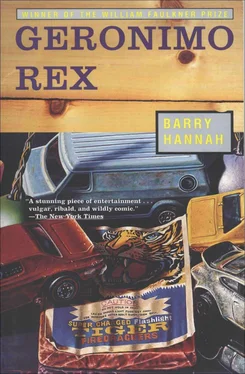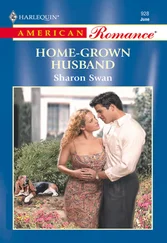Our cello man, Silas, stood up and crowded the door. Silas was also enormous. He was an athlete who had failed at Yale, his father’s alma mater. He lived in a constant rage over the general piety of Hedermansever and toadies like Dave, who kept the locks on it. His father had given thousands to Hedermansever, being a millionaire in chemical fertilizers and also a big Baptist. I suppose Dave knew some of this at least.
“We’re sitting down playing jazz music. This man”—Silas stood aside and pointed to me—“has a mute in his horn and is playing wonderfully. We are keeping it as down as we can. You … shitbound cocksuckers …” Silas dragged the cello like a piece of gorgeous trash, as Dave and the hall complainers minced back. “Who haven’t ever heard anything like this—”
“Get him for room deposit, I have to,” Dave was murmuring.
“You see this crayon picture on the door, Dave. That’s abstract art. You know why these boys made this picture? I’ll bet they did it because these white walls and halls and rooms were looking a little too much like a hospital for sanctimonious one-eyed fuckers, and for all the rest of you maggoty little finks around that one-eyed fucker.” He had lifted the cello.
“There are rules,” Dave said, against the other wall.
“I hope you mention some rules to me again, Dave. Me and you’re the biggest two men in this dorm. You mention rules again, I want to crack your cocksucking bones and let these little maggots watch me. I want you to make a phone call tonight, after you go downstairs, so somebody else will see me about some rules.”
It was amazing. Dave and the others simply rambled back to their rooms, stepping on each other quietly. I liked Silas. I liked his power over the college. I’d seen him up at the Hilltop a number of times and thought he was one of those football players who hadn’t made it at Ole Miss or Delta State and had come to Hedermansever for action in the small college league. He wore tee shirts with numbers front and back, and floppy jeans; he was freckled, his nose was broken or beaked, and he sprawled about. I found out he had not failed at Yale because of hate for it. I got the idea that he was so excited, being there, that he couldn’t write down anything in the classroom. On Yale, the East, Connecticut, and New York, he was still all babbling awe. He had had such Jewish and Polish and Greek friends. At Hedermansever he spent a good deal of his time lifting bar-bells, playing soccer with one other guy out on the football field, and searching for, as he said, meaningful group things. Never in my life had anybody taken up for me like he did against Dave and the hall people.
By, say, the eighth night, he was making a curious sort of progress on bass-part cello. He got a ripping, thrumming sound out of every note he made, no matter how fast we played, and I began dipping the tones, traveling with the bends of the cello sometimes; Joe the drummer fell on the tones and the thrums with great hustle — and Joe indeed could play. So I thought we might have something, just us three, no piano. It was odd, with no chording as you played. I suppose I thought of it as brave. It was intrepid , is what it was. I thought we were ready for the applause and the money. And I knew the club in Vicksburg. I wanted to have another chance at Vicksburg. The hills were fat and green, the ditches were steep, the houses hung on slants of old gloom, and the river was a rich ooze, like tears and whiskey. It would be fine to be happy in the cellars of this town, cutting away with some buddies on horn.
My school work was not going well lately. But there was a new kind of exhilaration in writing your name on the top of a mimeographed test sheet, handing it in blank, not having to sit there with your head in your hand. Back to the room. Silas was already there trying to do some phrases on the cello. Get the horn, the taste of fruity silver. Joe comes down at six. Ti-tat-di-ching, dinga, chingding achingdinga-ching, di oomp oomp. To blues and to jazz.
“Like, what we gon call ourselves,” said Joe. I told you he was a corny fool; also a bit of a liar. He said he’d studied at the Texas Conservatory of Jazz, which sounded like a place where cowboys play Glenn Miller.
“Call — man, you can’t name this. This band is too close to the truth to give a name. We are three individuals with a hell of a lot to say,” said Silas.
“Right.” Looking at the cello, you noticed Silas’s huge confident fingerson the neck.
“Well, like, will we phone up to warn them, like? Maybe we should.”
“That would take the sting out of us,” I said.
“We come as a surprise or not at all,” Silas agreed.
Bobby Dove came in at midnight. We musicians were sitting around, tired but merry.
“How’s that Amazon nookie?” Silas asked Fleece.
Fleece was sullen. After they left, he lay disgusted on the cot for a while.
“What does that big farthook Silas do , by the way? He looks like a jock but he doesn’t play sports. I hope to God he doesn’t think he’s playing that cello, either.”
“You wouldn’t know. He has some ideas on cello. I think it’s good, played like a bass.”
“I think you ought to fire Silas, then think about how in-finitely bad you still are.”
“Silas said I was terrific.”
“Well yes, compared to him. Has Silas asked you anything about Bet?”
I lied. Silas had told me he was calling Bet, but I didn’t want to get into this with Fleece.
“He’s telephoning her, you know. I hope you’re not sitting over there being an insect about this, thinking Silas is her secret telephone-lover. Don’t you think she told me? Don’t you know how we laugh over what he says? Tell me this. Has he ever said anything about me? C’mon.”
“Why should I tell?” I must have been smiling.
“I’d like to hear some of that farthook’s wit. Then I’ll leave you alone.”
“He said that you had better marry her quick so she could have some document to prove that you were making advances toward her.”
“You think that cheap little-vision is very funny, dont you?”
The club seemed to be three hundred Negroes, couples, packed up into an old butane gas tank. Perhaps it was a quonset hut of narrow dimensions. The façade was shingles with a peak arch and a Falstaff beer billboard off its stand, lit up by craning lights, waiting for you at the bottom of a hill steep and parallel with the nearby river. The façade looked landlocked, but once in the club, you didn’t know. The thing shook as if on weak stilts, and you could smell fish. The sign at the door mentioned a dollar cover charge. Because the Mean Men were playing. The hotshots and their dates were flocking here from all over Mississippi and even from Louisiana. The Mean Men had made records in Memphis and everybody knew it. All I knew about them was that they had been charmed to have a musician friend of mine back at Hedermansever sit in with them once.
We eased in, Silas and I carrying our cases, Joe hoping to use the traps of the Mean Men. We paid the dollar. The man in the box wasn’t certain about this. He just let the dollars pile up there and didn’t move his hand for them. Silas went right up to the stand after the number and explained to the band — all of them Negroes — how we thought we might take the stand and spell them. I saw him shake hands with the singer, and he seemed to’ve procured an introduction all round. The band had just finished a hot pinpointed arrangement of Negro-Latin jazz, eight instruments full, and my faith was sinking. But the singer took the mike and introduced, named us and our instruments, and we had to step up quickly so as not to seem like immobilized pink hams. The Mean Men broke by us like a school of dark cheerful fish. Joe the drummer proceeds to drag the traps nearer to center stand; I stand there with my horn out. The bandstand is aflame with pink lights, above and below, and I’m looking at the veins of my arms, thinking how bunny-nose pink I am, and how few men we are, above this crowd used to the Mean Men.
Читать дальше












